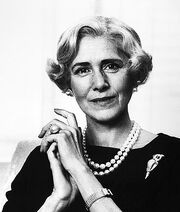
Clare Boothe Luce (10 March 1903-9 October 1987) was a member of the US House of Representatives (R-CN 4) from 3 January 1943 to 3 January 1947, succeeding Le Roy D. Downs and preceding John Davis Lodge. Luce was initially a feminist heroine and a liberal supportive of the New Deal, but, starting with her service in the US Congress, her views shifted towards staunch conservatism and anti-communism, partly influenced by her Catholic faith. She was known as a charismatic public speaker, and she campaigned for every Republican presidential nominee from Wendell Wilkie in 1940 to Ronald Reagan in 1984.
Biography[]
Clare Boothe Luce was born in New York City, New York in 1903, and she was raised in Garden City and Tarrytown. She became interested in the women's suffrage movement as a young woman, and she was raised as a New York socialite. She was first married to George Tuttle Brokaw from 1923 until their divorce in 1929; inn 1935, she married Henry Luce, the publisher of Time, Life, and Fortune. In 1936, she published a hit play, The Women, which had an all-female cast. She went on to write dramas, screen scenarios, fiction, journalism, and war reportage. Luce was originally a liberal and supporter of the New Deal as a protege of Bernard Baruch and supported the United States' alliance with the United Kingdom, while criticizing British colonial rule in India. In 1942, she was elected to the US House of Representatives, and she soon shifted towards conservatism and criticized President Franklin D. Roosevelt's foreign policy during World War II. She compared the Chinese Exclusion Act to Adolf Hitler's racial views, advocated aid for war victims abroad, and claimed that Roosevelt lied Americans into World War II. Luce toured Europe as the war ended, and she was present at the liberation of several Nazi concentration camps. After the war, she became a staunch anti-communist who warned that communist totalitarianism would lead to World War III. In 1946, she co-authored the Luce-Celler Act of 1946, which permitted Indians and Filipinos to immigrate to the United States, establishing a quota of 100 persons for each country and enabling them to become naturalized citizens. A convert to Catholicism in 1946, she campaigned on behalf of Dwight D. Eisenhower in 1952 (and every Republican presidential candidate for the rest of her life), winning over Catholic Democrats for the Eisenhower campaign. Eisenhower rewarded her with the important post of Ambassador to Italy, and she befriended Pope Pius XII, although the country's communist minority viewed her as a meddler. Luce served as ambassador from 1953 to 1956, when she resigned after falling sick from arsenic poisoning. By 1959, she was too conservative to secure the votes of Democratic members of the US Senate to serve as Ambassador to Brazil, and she and her husband sponsored anti-communist groups in Cuba following the 1959 Cuban Revolution. She considered a Conservative Party of New York State bid for the US Senate in 1964, but ultimately rejected it. Luce went on to serve on President Richard Nixon's President's Foreign Intelligence Advisory Board from 1973 to 1977, and she permanently settled in Washington DC. She once again served on the PFIAB under President Ronald Reagan from 1981 to 1983, and Reagan awarded her the Presidential Medal of Freedom in 1983. She died in 1987 at the age of 84.
